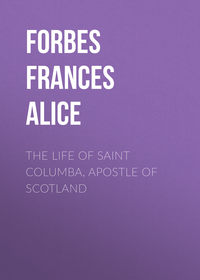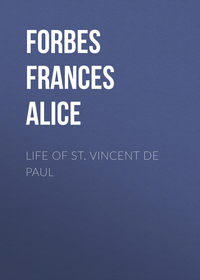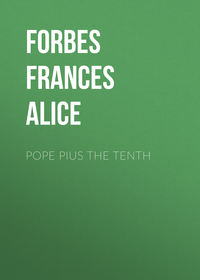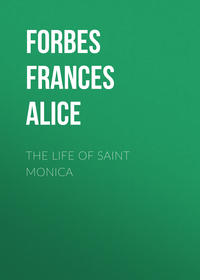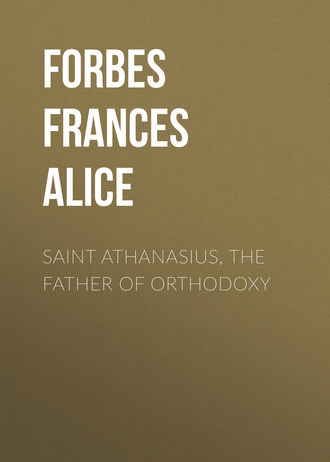 полная версия
полная версияSaint Athanasius, the Father of Orthodoxy
The other, seated on a low seat beside the Patriarch of Alexandria, is slight, fair and young; only his broad brow and keen, earnest eyes betray something of the spirit within; he shows no excitement. Serene and watchful, silent yet quick in his movements, he is like a young St. Michael leaning on his sword, ready to strike for the truth when the moment shall come – Athanasius the deacon.
The heresiarch is called upon to explain his doctrines. His discourse is long and eloquent. He uses to the utmost his powers of fascination. He tries to hide the full meaning of his words under beautiful expressions, but his meaning is clear to all – "Jesus Christ is not God."
The Fathers and Confessors of the Faith, stricken with horror at the blasphemy, cry out and stop their ears. The indignation is universal. Eusebius and his party are in consternation. Arius has been too outspoken. He has stated his opinions too crudely; such frankness will not do here; he is no longer among the ignorant. Eusebius himself rises to speak and, with the insinuating and charming manner for which he is famous, tries to gloss over what Arius has said.
The Son of God is infinitely holy, he says, the holiest of all the creations of the Father and far above them all. Very, very close to the Father Himself, so close that He is very nearly God. As a matter of fact, he declares, the Arians believe all that the Church teaches.
A letter is produced and read by one of the prelates; it was written by Eusebius himself to a friend. Full of heresy, it shows most clearly the double-dealing of the Arian Bishop and his party. The indignation breaks out afresh, and the letter is torn to shreds in the presence of the Council. Even Eusebius is abashed, but there are others to take his place. The Arians continue the argument.
Silent and watchful at his post sits the young man who is destined to be the champion of the Faith through all the troublous years to come. He has not spoken yet, but now Alexander makes him a sign. The sword flashes from its scabbard; woe to those on whom its blows shall fall! In a few words, sharp and clear as diamonds, Athanasius tears to pieces the veils in which the Arians had shrouded their true meaning. "Who has deceived you, O senseless," he asks, "to call the Creator a creature?"
He is the champion of Christ, the champion of the truth. The Bishops marvel at his words, which are as of one inspired; they thank God who has raised up so strong a bulwark against error. Alexander's eyes are aglow; it is for this that he has lived; he knew how it would be. His long life's work is nearly at an end; he can go now in peace. Athanasius is at his post.
But it is time to put an end to the discussion; Arius and his opinions are abhorred by everyone. A profession of Faith is drawn up by Hosius, the representative of Pope St. Sylvester, and presented for all to sign. It establishes forever the Godhead of Christ. To this day it is the profession of Faith of the whole Catholic world – the Nicene Creed.
"Born of the Father before all ages, God of God, Light of Light, true God of true God, begotten not made, consubstantial with the Father."
The Emperor has listened earnestly to the discussion, following it as well as he can with his limited knowledge of doctrine. He approves the profession of Faith with his whole heart; let it be presented to all to sign.
But first – one moment – this heresy must be stamped out once and forever or there will be trouble in the days to come. An addition must be made before the signatures are affixed. It runs thus: "And if any say, 'There was a time when God was not; or if any hold that the Son is not of the same substance with the Father, or is.. like a created being,' the Holy Catholic Apostolic Church condemns him, as it condemns forever Arius and his writings."
The text is then presented to the Bishops to sign. All are content but the seventeen Arians. The Emperor expresses his entire satisfaction with the decisions of the Council; he will uphold the law of the Church with the law of the State, he declares, and those who rebel will be punished.
The ranks of the Arians begin to waver; several Bishops sign the
Creed; soon there are only five left – Eusebius at their head.
The Emperor speaks of banishment.
The argument is a powerful one. Eusebius wavers. He receives a message from Constantia bidding him give way; resistance is useless. He signs the profession in company with Theognis of Nicea, his friend.
Arius, with several of his supporters, is then condemned to banishment, and his writings are to be burned publicly. The minds of all are at rest. Several other matters of less importance are settled satisfactorily. The Council is at an end.
But Constantine has not finished with the Bishops. Today begins the twentieth year of his reign, a day kept with great rejoicing by the Roman Emperors. A banquet has been prepared at the palace; he claims the honor of entertaining the Confessors and Fathers of the Faith.
Times have changed indeed. The soldiers of the Imperial Guard salute with drawn swords the guests of the Emperor as they pass between them into the palace – that Imperial Guard who in other days, which many there remember, had dragged the Christians to torture and to death.
The Emperor receives them with veneration, kissing devoutly the scars of those who have suffered for the Faith. The banquet over, he begs their prayers and loads them with gifts, giving to each of the Bishops a letter to the governor of his province ordering a distribution of wheat to the churches for the use of the poor.
The hearts of all are full of joy and thankfulness. Taking leave of the Emperor, they return, each man to his own country. The Council of Nicea is over.
But there were two in whose hearts there was neither joy nor peace nor thankfulness; they were Eusebius of Nicomedia and Theognis of Nicea. Were they to return to their sees and confess themselves beaten? It would be a bitter homecoming. The officials of the palace were well known to Eusebius. He bribed the librarian to let him see once more the famous document that had just been signed by so many Bishops. Then, seizing a moment when the guardian's back was turned, the two Arians deleted their names from the profession of Faith and, returning home, continued to teach the doctrines which the Church had condemned. They counted on the protection of Constantia and her influence with the Emperor, but they were mistaken.
Three months after the Council of Nicea, Eusebius and Theognis were deposed by Alexander and the Bishops of Egypt, who elected Catholic prelates in their stead. The Emperor supported the decision of the Church, pronouncing a sentence of banishment on the rebels. "Eusebius has deceived me shamefully," he wrote to the faithful in Nicomedia.
Who could foresee that the Emperor, whose eyes were at last opened to the perfidy of his friend, would before long allow himself to be deceived more shamefully still by the very man whose dishonesty he had proved?
Chapter 4 THE CALM BEFORE THE STORM
WITH the enemies of the Church in exile, for a time there was peace. The heathen came flocking from every side to embrace the Faith. Pagan temples were overthrown and Christian churches were erected in their place. The Emperor himself built no less than eight in Rome, under the direction of Pope St. Sylvester, and furnished them with all that was required for the worship of God.
But Constantine was a stranger in the capital of his kingdom; he had spent his youth at the court of Nicomedia, and looked upon the East as his home. Rome, moreover, had tragic associations for him. It was there that he had caused his young son Crispus, falsely accused of treason by his stepmother Fausta, to be put to death. The young Caesar had been brave and upright and a favorite with all. Too late did his father learn that he was innocent. Fausta paid the penalty for her evil deed, but her death could not give life to the innocent victim.
Constantine resolved, therefore, to build himself an Imperial city in the land which he loved, far from the scene of the tragedy. He laid its foundations in Byzantium and gave it the name of Constantinople, or the city of Constantine. Everything was done to make the new capital the most magnificent city in the world. Works of art were brought from afar, the most skillful artists and builders were assembled from all the cities of Europe and of the East, enormous sums of money were spent, Christian churches were built; but Constantine could not give to his Imperial city what was wanting to himself – a pure and steadfast faith. Constantinople was destined to be the home of every heresy.
In the meantime the holy Patriarch Alexander had gone to his rest. As he lay on his deathbed he called for his beloved Athanasius, but there was no reply. Athanasius had fled from the city, fearing from certain words of the old man that he would be chosen to succeed him.
"Athanasius!" called the Patriarch once more.
There was one present who bore the same name, a not uncommon one in the East; they brought him to the bedside of the dying Bishop, but his eyes looked past him into space.
"Athanasius!" he called once more, "you think you can escape, but it shall not be so." And with these words he died.
The same thought had been in the hearts of all. Athanasius was known for his zeal and learning, his mortified life and his ardent love of God. He was young, it was true, but he was wiser than many older men. When the Bishops of the Church assembled to elect their new Patriarch, the whole Catholic population surrounded the church, holding up their hands to Heaven and crying, "Give us Athanasius!" The Bishops asked nothing better. Athanasius was thus elected, as St. Gregory tells us, by the suffrages of the whole people and by the choice of the Bishops of the Church.
It was a heavy burden to be laid on the shoulders of a young man scarcely thirty years of age. There were trials and combats ahead before which, if Athanasius had seen them, even his bold and undaunted spirit might have quailed. But the will of God, once made known to him, was accepted bravely. He would bear the burden with all the courage of his strong heart until the time came to lay it down.
The first few years of Athanasius' rule were years of peace during which he devoted himself to the work he loved, the conversion of the pagans and the visitation of his huge diocese, the Patriarchate of Alexander. He traveled from city to city confirming and strengthening the Church and making friends with the holy men over whom he had been called to rule.
One day, when he had been but a few months Patriarch, a message was brought to him from a stranger who wished to speak with him. His name was Frumentius, and he had traveled from a distant country. Athanasius was presiding at a meeting of Bishops. "Let him be brought in," he said, "and let him tell us what he desires." The stranger was a man of noble bearing and gentle manners. He had a wondrous tale to tell. He and his brother Ædesius, left orphans at an early age, had been adopted by an uncle who was a learned man and a philosopher. Desiring greatly to undertake a voyage to Abyssinia to study the geography of the country and unwilling to interrupt the education of his two young charges, he took them with him, that they might continue their studies under his care. His work finished, he set sail for home with the two boys, but the boat, having put into a port for provisions, was set upon by savages, and everyone on board was killed.
Now, it happened that the boys had landed and were reading together under a tree on the shore. The savages had pity on their youth and, instead of killing them, carried them off and presented them to their King as slaves. The boys, who were intelligent and lovable, soon gained the affections of their barbarian master. Arrived at manhood, they were given positions of trust in the kingdom and loaded with every honor. Frumentius, the elder, was especially beloved by the King, over whom he gained a great influence for good. But the King fell sick and, being near to death, called his wife, to whom he had left the guardianship of his young son. "Let Frumentius help you in the government," he said; "he is wiser and more faithful than any in the kingdom."
The Queen Mother accordingly appointed Frumentius as the tutor of the young King, and Governor of the State, while his brother Ædesius was given a less important position. Frumentius, whose earnest desire was to see the land that he governed Christian, summoned all the Christian merchants who came to trade in the country and, giving them presents, begged them to build houses of prayer and to do their utmost to win the barbarians to the Faith. There were many conversions, and by the time the young King had reached his majority, several Christian communities were scattered throughout the State.
His task being now at an end, Frumentius asked leave to return to his own land with his brother Ædesius. They had a hard task to persuade the King and the Queen Mother to let them go, but at last they prevailed.
Frumentius, whose heart was yearning over the country to which he owed so much, had come straight to the Patriarch of Alexandria to beg of him that he would send a Bishop to preside over the growing number of churches in Abyssinia and to preach the Faith in the districts where it was not yet known.
The Patriarch and the Bishops had followed the story with the greatest interest. When Frumentius ceased speaking, there was a moment of silence, broken suddenly by Athanasius himself.
"Who is more worthy of such a ministry," he cried, "than the man who stands before us?"
The suggestion was approved by all. Frumentius was ordained by the Patriarch, who gave him his blessing and bade him return to his mission. He was honored as a Saint in Abyssinia, where he labored zealously all his life for Christ. Ædesius, his brother, became a priest also and helped in the good work.
Athanasius, as we have already seen, had spent a part of his youth with the monks of the desert. It was his proudest boast that he had acted as acolyte to the great St. Antony. He resolved, therefore, to visit the district known as the Thebaid, where St. Pachomius, the father of monasticism in the East, had founded many monasteries and drawn up a rule for the monks.
Pachomius had been one of a body of young soldiers seized against their will and forced to fight in the wars between Constantine and Maxentius. It happened one day during a journey that they landed at Thebes in Egypt, where they were treated with harshness and cruelty. Hungry, poorly clad and miserable, the young soldiers were lamenting their ill fortune when a party of strangers approached them from the town, welcoming them as friends and brothers and giving them food, garments and all that they so badly needed.
"Who are these good men?" asked Pachomius of a bystander.
"They are Christians," was the answer. "They are kind to everyone, but especially to strangers."
"What is a Christian?" persisted the young soldier.
"A man who believes in Jesus Christ, the only Son of God, and does good to all," was the reply.
Pachomius reflected for a few minutes and then withdrew a little way from his companions. "Almighty God, who have made Heaven and earth," he cried, lifting his hands to Heaven, "if You will hear my prayer and give me a knowledge of Your Holy Name, and deliver me from the position in which I am, I promise You that I will consecrate myself to Your service forever."
Not long after, Pachomius was set free and, seeking out a Christian priest, received Baptism and instruction. Then, going at once to the cell of an old hermit called Palemon, famous for his holy and mortified life, he knocked at the door of his hut.
"Who are you, and what do you want?" asked the old man, opening his door a few inches.
"I am called Pachomius, and I want to be a monk," was the answer.
"You cannot be a monk here," said Palemon. "It is a hard thing to be a true monk, and there few who persevere."
"Perhaps so," replied Pachomius; "but all people are not alike."
"I have already told you," repeated the old man, "that you cannot be a monk here. Go elsewhere and try; if you persevere you can come back."
"I would rather stay with you," said Pachomius.
"You do not know what you are asking," answered Palemon. "I live on bread and salt; I pray and do penance the greater part of the night – sometimes the whole night through."
Pachomius shivered, for he was a sound sleeper, but he replied sturdily enough:
"I hope in Jesus Christ that, helped by your prayers, I shall persevere."
Palemon could resist him no longer. He took the young man to live with him and found him a humble and faithful disciple. After some years, the two hermits went together to the desert of the Thebaid and began the work to which God had called Pachomius, for Palemon died soon after.
Many monasteries were founded, and men flocked to the desert to give themselves to God. They slept on the bare ground, fasted continually and cultivated the barren earth or made baskets and mats of the coarse reeds that grew in the marshes, selling them for the profit of the poor. Twice during the night the weird blast of the horn that summoned them to prayer broke the vast silence of the desert.
Hearing of the arrival of Athanasius, Pachomius came down from his lonely monastery of Tabenna, surrounded by his monks; but he hid himself among them from humility, or from the fear that Athanasius would do him too much honor. The Saint, however, detected the Saint, and they were soon firm friends. To the Patriarch, the monks of Egypt represented all that was best and strongest in the national spirit. On these men he knew he could rely, and his hopes were not disappointed. The solitaries of the desert, to a man, would be faithful to Athanasius during the years of trial that followed.
Indeed, wherever Athanasius went throughout his vast diocese, the hearts of all loyal and noble men went out to him instinctively. He was a precious gift of God to Egypt – a precious gift of God to the whole Catholic Church.
Chapter 5 FALSE WITNESSES
THE storm of persecution which was to fall with such fury upon St.
Athanasius was already gathering.
Constantia, the Emperor's favorite sister, who had always been strongly in favor of the Arians, became very ill. The priest who attended her on her deathbed, a friend and tool of Eusebius of Nicomedia, induced her to persuade Constantine, who visited her continually during her illness, that Arius and his friends had been unjustly condemned and that the judgment of God would fall on him and his empire in consequence. Constantine, always easily influenced by his immediate surroundings, began to waver. Constantia soon died, but the Arian priest continued the work that had been so successfully begun. Arius believed all that the Church believed, he pleaded; let him at least be allowed to come into the presence of the Emperor; let him have a chance to prove his innocence.
Although Constantine had heard with his own ears the blasphemies of the heresiarch, although he had approved so heartily of the decision of the Council which condemned him and had enforced it with the power of the State, he gave way before the persuasions of this stranger.
"If Arius can assure me that he believes the profession of Faith set forth by the Council of Nicea," he said, "he may return."
The good news was instantly made known to the heretic and his friends, and Arius hastened to Constantinople, where he was admitted into the Emperor's presence.
"Is it true that you believe what the Church teaches?" asked
Constantine.
"I take my solemn oath that I believe what I hold in my hand," replied
Arius, unfolding the Nicene Creed.
In the hollow of his palm was concealed a statement of his own false doctrines, but this the Emperor could not know. He professed himself satisfied, and thus the seed was sown which was to bring forth bitter fruit during centuries to come.
With Arius recalled, there was no longer any reason why Eusebius and Theognis, who declared that they shared his opinions, should remain in banishment. Once in Constantinople, Eusebius regained all his old influence over the Emperor.
From that day forth, the Constantine of the heavenly vision, the Constantine of the Council of Nicea, noble, wise and humble, disappears from the pages of history, and a man changeable, capricious and uncertain takes his place.
The first act of Eusebius and Theognis was to drive out the Catholic Bishops who had been elected to replace them in their sees; the second was to look about them to see who was likely to stand in their way. Eustathius, the Bishop of Antioch, an intrepid defender of the Faith, must be gotten rid of at once, they decided, and they proceeded to plot his ruin.
They started for Jerusalem to visit – or at least, so they said – the beautiful Church of the Holy Cross which the Emperor had just built. On their way home, they announced that they would stay for a short time at Antioch, and they invited all the Bishops who were likely to be friendly to meet them there in council. They were received with the greatest courtesy by Eustathius, who did all that he could to make their visit pleasant. They had, however, bribed an abandoned wretch of the town to enter while the council was sitting and accuse Eustathius before all present of a scandalous crime.
Affecting to be greatly grieved and horrified at the accusation, they deposed Eustathius and elected an Arian in his place, silencing those who opposed their unjust and unlawful conduct by declaring that they acted by command of the Emperor. Constantine was then appealed to, but in vain. The Arians were all-powerful.
The next obstacle to be removed was Athanasius, but Eusebius was clever enough to realize that this would be no easy task. Athanasius was not only the chief Bishop of the Eastern Church, but one who had defeated the Arians several times before on their own ground.
He began by writing a letter to the Patriarch in which he informed him that Constantine, having learned that the views of Arius were quite correct, had been pleased to recall him from banishment. It was only just and fair, therefore, that Athanasius should receive him into communion; Eusebius, indeed, had reason to know that the Emperor would be greatly displeased if he refused to do so.
Athanasius' reply to this threatening message was short and decided. Neither threats nor persecution, he said, would induce him to go against the decrees of the Council of Nicea. Arius had been condemned by the universal Catholic Church; by that decision all true Catholics must stand.
Eusebius was not at all discouraged. He wrote to the Emperor and told him how lightly the Patriarch had treated his wishes. "Athanasius is much too young for such a responsible position," he wrote, "and is of a quarrelsome and obstinate temper. He is the last man in the world to fill a post which, if peace is to be kept in the Church, requires the greatest tact and charity." Perhaps, he suggested, if the Emperor himself were to write to him, he might be made to see the matter in a different light. A threat of banishment is always a powerful argument.
On receiving this letter, the Emperor – to his shame, be it said – wrote to the Patriarch as follows: "Being informed of my pleasure, admit all who wish to communion with the Church. If I hear of your standing in the way of any who seek it, I will send at once those who will depose you from your see."
The reply of the Patriarch was firm and courageous. "It is impossible," he answered, "for the Catholic Church to hold communion with those who deny the Divinity of the Son of God and who are therefore fighting against Him."
Eusebius was absent when the letter arrived, and the changeable Constantine was favorably impressed by its noble and fearless tone; the matter was therefore dropped.
Eusebius, still determined on the Patriarch's ruin, looked about him for a tool. He found the Meletians always troublesome and ready to join in a plot against those in authority. Three of them, appearing suddenly at Nicomedia where Constantine was then staying, accused Athanasius of having usurped the Royal power by levying an unlawful tax upon the people. Unfortunately for the success of this little plot, there were present at Court at that moment two priests of Alexandria who were able to prove to the Emperor that the Patriarch was completely innocent. Constantine even wrote a letter to Athanasius telling him of the false charge brought against him, severely blaming those who had made it and inviting him to come himself to Nicomedia.


